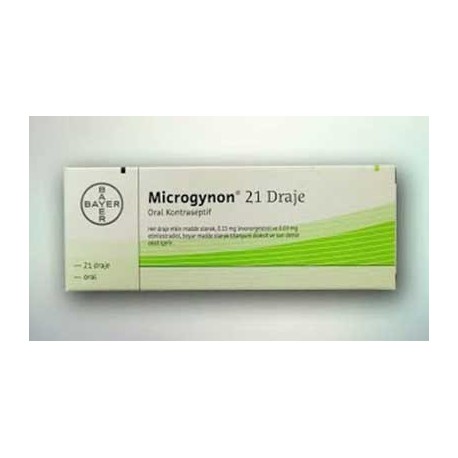 View larger
View larger Microgynon Contraceptive 21 Pills
MCG2288
New product
BUY MORE PAY LESS
| Quantity | Discount | |
|---|---|---|
| 2 | 5% | |
| 3 | 10% | |
| 4 | 15% | |
| 5 | 20% |
Volume discounts
| Quantity | Discount | You Save |
|---|---|---|
| 2 | 5% | Up to $4.40 |
| 3 | 10% | Up to $13.20 |
| 4 | 15% | Up to $26.40 |
| 5 | 20% | Up to $44.00 |
More info
MICROGYNON® 21 dragee
It is taken orally.
• Active ingredients: Each dragee contains 0.15 mg of levonorgestrel and 0.03 mg of ethinylestradiol.
• Excipients: Lactose monohydrate, corn starch, povidone 25, talc, magnesium
stearate, sucrose, povidone 90, macrogol 6000, calcium carbonate, montanglycol wax, yellow
iron oxide (E172), titanium dioxide (E171), glycerol 85%
Important things to know about combined hormonal contraceptives (CHCs):
• One of the most reliable reversible birth control methods if used properly
• They partially increase the risk of blood clots in the veins and arteries, especially in the first year of use or when restarting COC after a break of 4 weeks or more.
• If you think you may have symptoms of a blood clot, please be alert and contact your doctor (see section 2 “Blood clots”).
• The pill can reduce the risk of ovarian and uterine cancer when used for a long time.
• The pill does not protect against sexually transmitted diseases.
• This medicine may increase the risk of problems such as blood clots and breast cancer.
• Some women should not use the pill because of existing medical problems or illnesses.
Please read this leaflet to make sure MICROGYNON is suitable for you.
• It is important to use MICROGYNON as directed and to start each pack on time to prevent pregnancy. Make sure you understand what to do if you forget to take the pill or think you are pregnant.
1. What MICROGYNON is and what it is used for
• MICROGYNON is available in packages of 21 dragees and the dragees are beige. Each dragee
It contains 0.15 mg of levonorgestrel and 0.03 mg of ethinylestradiol as active ingredient.
• Oral contraceptive pills containing estrogen and progesterone hormones are called “Combined Oral Contraceptive (COC)”. MICROGYNON is also a drug in this group.
• The levonorgestrel and ethinylestradiol hormones in MICROGYNON are secreted from the pituitary gland (a gland in the lower part of the brain that secretes important hormones) and the follicle (small sac containing the egg cell) matures until the ovulation stage.
They suppress the secretion of follicle stimulating hormone (FSH) and luteinizing hormone (LH, a hormone involved in the menstrual cycle), which are necessary for ovulation, thus preventing ovulation. Levonorgestrel thickens the cervical mucus, thus preventing sperm from reaching the ovum.
The movements and secretions of the fallopian tubes (tube-shaped structures that extend from the upper corners of the uterus to the ovaries) may also be affected. Levonorgestrel also thins the uterine lining, preventing a fertilized egg from implanting.
• MICROGYNON is used to prevent pregnancy.
DO NOT USE MICROGYNON in the following situations:
Do not use MICROGYNON if any of the following conditions apply. If any of these apply to you, consult your doctor before using MICROGYNON. Your doctor may use a different type of pill or a completely different birth control method (hormonal
may recommend that you use Red: Changes requested by ministry letter dated 28.11.2016 and numbered 158582 Blue: Editorial changes
If;
• If you have deep vein thrombosis (DVT; occlusion of a leg vein), pulmonary embolism (PE; occlusion of the pulmonary arteries by a blood clot), or a history of clots or clots elsewhere in your body (previous/formed) • If you have a disorder that affects blood clotting (For example, protein C deficiency,
hereditary or acquired predisposition to venous or arterial thrombosis, such as protein S deficiency, antithrombin-III-deficiency Factor V Leiden or APC resistance),
• if you need to have surgery that causes prolonged immobility (see section 'Blood clots'),
• If you have had a heart attack or stroke,
• If you have angina pectoris, which may be the first sign of a heart attack, which is caused by the contraction of the heart muscle due to the lack of oxygen in the vessels feeding the heart and may spread to the left arm, or if there is a mild stroke called transient ischemic attack without a permanent effect (or if it has happened in the past),
• If you have one of the following diseases that may increase the risk of clots in your arteries:
• If you have diabetes that affects the veins,
• Very high blood pressure,
• Very high blood fat level (cholesterol or triglycerides),
• A condition known as hyperhomocysteinemia (the only inherited risk factor shown to cause blood clots in both arteries and veins)
• If you have (or have had in the past) migraine accompanied by symptoms such as visual disturbances, slurred speech, weakness or loss of sensation in any part of the body,
• If you have diabetes that affects the veins,
• Current or previous liver disease (signs of which are jaundice on the skin)

